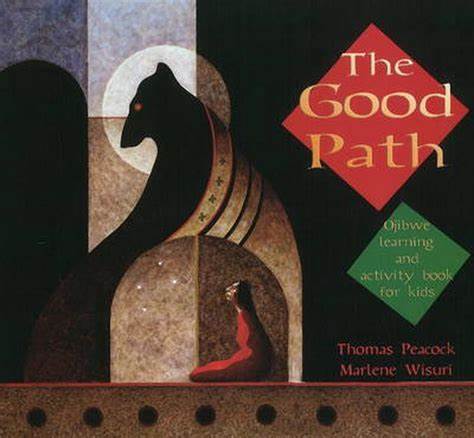One of the greatest debts Ojibwe people owe women came during the difficult time that followed the coming of European settlers. This was a time when the people became lost physically, emotionally, and spiritually. All the confusion following the coming of the white people threatened to break families and communities apart, and it was women who held the families together. When men lost their roles as family provider, women stepped into that role. They cultivated large gardens and worked in town jobs for the white settlers so there was food to put on the table. They kept the home together when men had to leave to work in lumber camps and on farms. They kept families together when some men turned to alcohol. They raised children when some men abandoned their families. They continued to teach the old ways when some men were no longer there to teach. And they kept alive the old stories as reminders of who we are as Ojibwe people. Here, a grandmother teaches an important lesson to her granddaughter:
When the forest weeps, the Anishinabe who listen will look back over the years. In each generation of Ojibway, there will be a person who will hear the si-si-gwa-d (the murmuring of the trees when the branches rub against each other), who will listen and remember and pass it on to their children. Remembering our past and acting accordingly will ensure that we, the Ojibway, will always people the earth.
Today’s Ojibwe women are leaders in tribal government, doctors, teachers, attorneys, and businesspeople. They are modern warriors who help make certain that the Ojibwe people have a voice in this country. Most are mothers as well.
While many outstanding women live in Ojibwe country, two deserve special mention. Winona LaDuke, a White Earth Ojibwe, ran for vice president of the United States in 2002. Louise Erdrich, a Turtle Mountain Ojibwe, is one of America’s foremost writers.
But Ojibwe women at all levels are doing important work in their communities. They work at our powwows, visit the ill and elderly, and organize events to serve those in need. They are our mothers, grandmothers, aunties, sisters, wives, and daughters. We honor them.
Good Path Projects…Activities:
-Identify a girl or woman you hold in great respect. Interview that person and write a story about her.
-Use books and the computer to learn how some cultures treat women and men differently. Are there cultures where the roles are considered unequal? Are there cultures where women hold the dominant role? Are women and men treated equally in modern America?
-Use books and the computer to learn about contemporary Ojibwe women, including activist Winona LaDuke and author Louise Erdrich.
Comprehension Questions
1. What is one of the ways that Ojibwe women helped keep families together after Europeans came to America?
A. They fought alongside their men, to keep the white people at bay.
B. They went to work in lumber camps.
C. They cultivated large gardens to put food on the table.
A. She ran for president.
B. She is an environmentalist.
C. She is a famous American author who has written many books.
Your Thoughts
Vocabulary
4. List any vocabulary words below.

